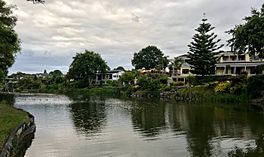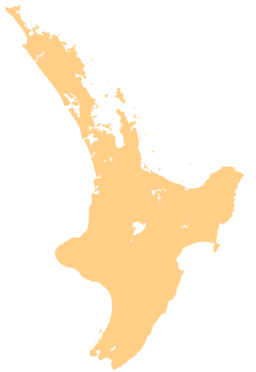Hokowhitu Lagoon facts for kids
Quick facts for kids Hokowhitu Lagoon |
|
|---|---|
| Centennial Lagoon | |
 |
|
| Coordinates | 40°22′2.42″S 175°37′44.22″E / 40.3673389°S 175.6289500°E |
| Type | Oxbow lake |
| Primary inflows | Artesian Bore |
| Primary outflows | Earthquake-produced drainage from unknown source |
| Catchment area | 2.7 km2 (1.0 sq mi) |
| Max. length | ~1.06 km (0.66 mi) |
| Max. width | ~70 m (230 ft) |
| Average depth | 2.2 m (7.2 ft) (as of 2009) |
| Settlements | Palmerston North |
Hokowhitu Lagoon, also known as Centennial Lagoon, is a natural lake in Palmerston North, New Zealand. It's a special type of lake called an oxbow lake. This means it was once part of a winding river, the Manawatu River. Over time, the river changed its path, leaving behind this curved section of water.
The lagoon is surrounded by interesting places. You can find a walking path, the historic Caccia Birch House, and buildings that used to be part of Massey University. These buildings are now used by the New Zealand Defence Force, Te Wānanga o Aotearoa, and a theatre group. The area around the lagoon is even named after it, called Hokowhitu.
To keep the lagoon full, water comes from an artesian bore. This is a special well drilled deep into the ground. It goes down about 94 metres into an underground water source called an aquifer. This bore was finished in 2009 and supplies the lagoon with a huge amount of water every day – about 250,000 litres!
Life and Activities at the Lagoon
Hokowhitu Lagoon is home to many different kinds of water life and birds. The most common fish you'll find here is the Perch. Studies have shown there are about 44 perch for every 100 square metres of water.
There's a popular walking track that goes all the way around the lagoon. It's about 1.1 kilometres long and is a favourite spot for people to enjoy a leisurely stroll. As you walk, you'll cross a truss bridge that spans the lagoon roughly in the middle.
The historic Caccia Birch House is located on the northern side of the lagoon. This beautiful house was built way back in 1892. It was later given to the government in 1941 and is now a protected historic site.
Why the Water Levels Change
Sometimes, the water levels in Hokowhitu Lagoon drop. This happened in 2014 after a big earthquake, the 2014 Eketahuna earthquake. The earthquake caused cracks or channels to open up under the lake. This made the water leak out from the bottom of the lagoon.
The leaking continued for a while. In December 2014, scientists put a special, safe dye into the water. This helped them track where the water was going and find the leaks. Even though the artesian bore adds a lot of water daily, it couldn't keep up with the heavy leaking caused by the earthquake.
In the middle of 2016, a team of divers went into the lagoon. Their job was to explore the lakebed and find exactly where the water was escaping. This helped them understand how to fix the problem and keep the lagoon full.
 | Charles R. Drew |
 | Benjamin Banneker |
 | Jane C. Wright |
 | Roger Arliner Young |


